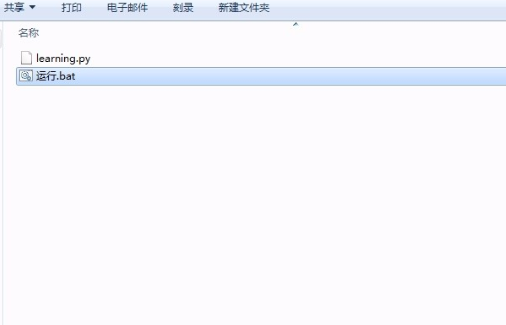python如何使用代码运行助手
python代码运行助手是能在网页上运行python语言的工具。因为python的运行环境在很多教程里都是用dos的,黑乎乎的界面看的有点简陋,所以出了这python代码运行助手,作为ide。
实际上,python代码运行助手界面只能算及格分,如果要找ide,推荐使用jupyter。jupyter被集成到ANACONDA里,只要安装了anacoda就能使用了。
1、要打开这运行助手首先要下载一个learning.py,如果找不到可以复制如下代码另存为“learning.py”,编辑器用sublime、或者notepad++。
#!/usr/bin/env python3# -*- coding: utf-8 -*- r’’’learning.py A Python 3 tutorial from http://www.liaoxuefeng.com Usage: python3 learning.py’’’ import sys def check_version(): v = sys.version_info if v.major == 3 and v.minor >= 4:return True print(’Your current python is %d.%d. Please use Python 3.4.’ % (v.major, v.minor)) return False if not check_version(): exit(1) import os, io, json, subprocess, tempfilefrom urllib import parsefrom wsgiref.simple_server import make_server EXEC = sys.executablePORT = 39093HOST = ’local.liaoxuefeng.com:%d’ % PORTTEMP = tempfile.mkdtemp(suffix=’_py’, prefix=’learn_python_’)INDEX = 0 def main(): httpd = make_server(’127.0.0.1’, PORT, application) print(’Ready for Python code on port %d...’ % PORT) httpd.serve_forever() def get_name(): global INDEX INDEX = INDEX + 1 return ’test_%d’ % INDEX def write_py(name, code): fpath = os.path.join(TEMP, ’%s.py’ % name) with open(fpath, ’w’, encoding=’utf-8’) as f:f.write(code) print(’Code wrote to: %s’ % fpath) return fpath def decode(s): try:return s.decode(’utf-8’) except UnicodeDecodeError:return s.decode(’gbk’) def application(environ, start_response): host = environ.get(’HTTP_HOST’) method = environ.get(’REQUEST_METHOD’) path = environ.get(’PATH_INFO’) if method == ’GET’ and path == ’/’:start_response(’200 OK’, [(’Content-Type’, ’text/html’)])return [b’<html><head><title>Learning Python</title></head><body><form method='post' action='/run'><textarea name='code' style='width:90%;height: 600px'></textarea><p><button type='submit'>Run</button></p></form></body></html>’] if method == ’GET’ and path == ’/env’:start_response(’200 OK’, [(’Content-Type’, ’text/html’)])L = [b’<html><head><title>ENV</title></head><body>’]for k, v in environ.items(): p = ’<p>%s = %s’ % (k, str(v)) L.append(p.encode(’utf-8’))L.append(b’</html>’)return L if host != HOST or method != ’POST’ or path != ’/run’ or not environ.get(’CONTENT_TYPE’, ’’).lower(). startswith(’application/x-www-form-urlencoded’):start_response(’400 Bad Request’, [(’Content-Type’, ’application/json’)])return [b’{'error':'bad_request'}’] s = environ[’wsgi.input’].read(int(environ[’CONTENT_LENGTH’])) qs = parse.parse_qs(s.decode(’utf-8’)) if not ’code’ in qs:start_response(’400 Bad Request’, [(’Content-Type’, ’application/json’)])return [b’{'error':'invalid_params'}’] name = qs[’name’][0] if ’name’ in qs else get_name() code = qs[’code’][0] headers = [(’Content-Type’, ’application/json’)] origin = environ.get(’HTTP_ORIGIN’, ’’) if origin.find(’.liaoxuefeng.com’) == -1:start_response(’400 Bad Request’, [(’Content-Type’, ’application/json’)])return [b’{'error':'invalid_origin'}’] headers.append((’Access-Control-Allow-Origin’, origin)) start_response(’200 OK’, headers) r = dict() try:fpath = write_py(name, code)print(’Execute: %s %s’ % (EXEC, fpath))r[’output’] = decode(subprocess.check_output([EXEC, fpath], stderr=subprocess.STDOUT, timeout=5)) except subprocess.CalledProcessError as e:r = dict(error=’Exception’, output=decode(e.output)) except subprocess.TimeoutExpired as e:r = dict(error=’Timeout’, output=’执行超时’) except subprocess.CalledProcessError as e:r = dict(error=’Error’, output=’执行错误’) print(’Execute done.’) return [json.dumps(r).encode(’utf-8’)] if __name__ == ’__main__’: main()
2、再用一个记事本写如下的代码:
@echo offpython learning.pypause
另存为‘运行.bat’
3、把“运行.bat”和“learning.py”放到同一目录下。

4、双击运行“运行.bat',之后会弹出黑色的dos窗口,这个窗口不要关闭。

5、输入网址对应的网址和端口,整个过程就完成了。

知识点扩展:
Python在线运行代码助手
#!/usr/bin/env python3# -*- coding: utf-8 -*- r’’’learning.py A Python 3 tutorial from http://www.liaoxuefeng.com Usage: python3 learning.py’’’ import sys def check_version(): v = sys.version_info if v.major == 3 and v.minor >= 4: return True print(’Your current python is %d.%d. Please use Python 3.4.’ % (v.major,v.minor)) return False if not check_version(): exit(1) import os,io,json,subprocess,tempfilefrom urllib import parsefrom wsgiref.simple_server import make_server EXEC = sys.executablePORT = 39093HOST = ’local.liaoxuefeng.com:%d’ % PORTTEMP = tempfile.mkdtemp(suffix=’_py’,prefix=’learn_python_’)INDEX = 0 def main(): httpd = make_server(’127.0.0.1’,PORT,application) print(’Ready for Python code on port %d...’ % PORT) httpd.serve_forever() def get_name(): global INDEX INDEX = INDEX + 1 return ’test_%d’ % INDEX def write_py(name,code): fpath = os.path.join(TEMP,’%s.py’ % name) with open(fpath,’w’,encoding=’utf-8’) as f: f.write(code) print(’Code wrote to: %s’ % fpath) return fpath def decode(s): try: return s.decode(’utf-8’) except UnicodeDecodeError: return s.decode(’gbk’) def application(environ,start_response): host = environ.get(’HTTP_HOST’) method = environ.get(’REQUEST_METHOD’) path = environ.get(’PATH_INFO’) if method == ’GET’ and path == ’/’: start_response(’200 OK’,[(’Content-Type’,’text/html’)]) return [b’<html><head><title>Learning Python</title></head><body><form method='post' action='/run'><textarea name='code' style='width:90%;height: 600px'></textarea><p><button type='submit'>Run</button></p></form></body></html>’] if method == ’GET’ and path == ’/env’: start_response(’200 OK’,’text/html’)]) L = [b’<html><head><title>ENV</title></head><body>’] for k,v in environ.items(): p = ’<p>%s = %s’ % (k,str(v)) L.append(p.encode(’utf-8’)) L.append(b’</html>’) return L if host != HOST or method != ’POST’ or path != ’/run’ or not environ.get(’CONTENT_TYPE’,’’).lower().startswith(’application/x-www-form-urlencoded’): start_response(’400 Bad Request’,’application/json’)]) return [b’{'error':'bad_request'}’] s = environ[’wsgi.input’].read(int(environ[’CONTENT_LENGTH’])) qs = parse.parse_qs(s.decode(’utf-8’)) if not ’code’ in qs: start_response(’400 Bad Request’,’application/json’)]) return [b’{'error':'invalid_params'}’] name = qs[’name’][0] if ’name’ in qs else get_name() code = qs[’code’][0] headers = [(’Content-Type’,’application/json’)] origin = environ.get(’HTTP_ORIGIN’,’’) if origin.find(’.liaoxuefeng.com’) == -1: start_response(’400 Bad Request’,’application/json’)]) return [b’{'error':'invalid_origin'}’] headers.append((’Access-Control-Allow-Origin’,origin)) start_response(’200 OK’,headers) r = dict() try: fpath = write_py(name,code) print(’Execute: %s %s’ % (EXEC,fpath)) r[’output’] = decode(subprocess.check_output([EXEC,fpath],stderr=subprocess.STDOUT,timeout=5)) except subprocess.CalledProcessError as e: r = dict(error=’Exception’,output=decode(e.output)) except subprocess.TimeoutExpired as e: r = dict(error=’Timeout’,output=’执行超时’) except subprocess.CalledProcessError as e: r = dict(error=’Error’,output=’执行错误’) print(’Execute done.’) return [json.dumps(r).encode(’utf-8’)] if __name__ == ’__main__’: main()
到此这篇关于python如何使用代码运行助手的文章就介绍到这了,更多相关python代码运行助手用法内容请搜索好吧啦网以前的文章或继续浏览下面的相关文章希望大家以后多多支持好吧啦网!
相关文章:

 网公网安备
网公网安备